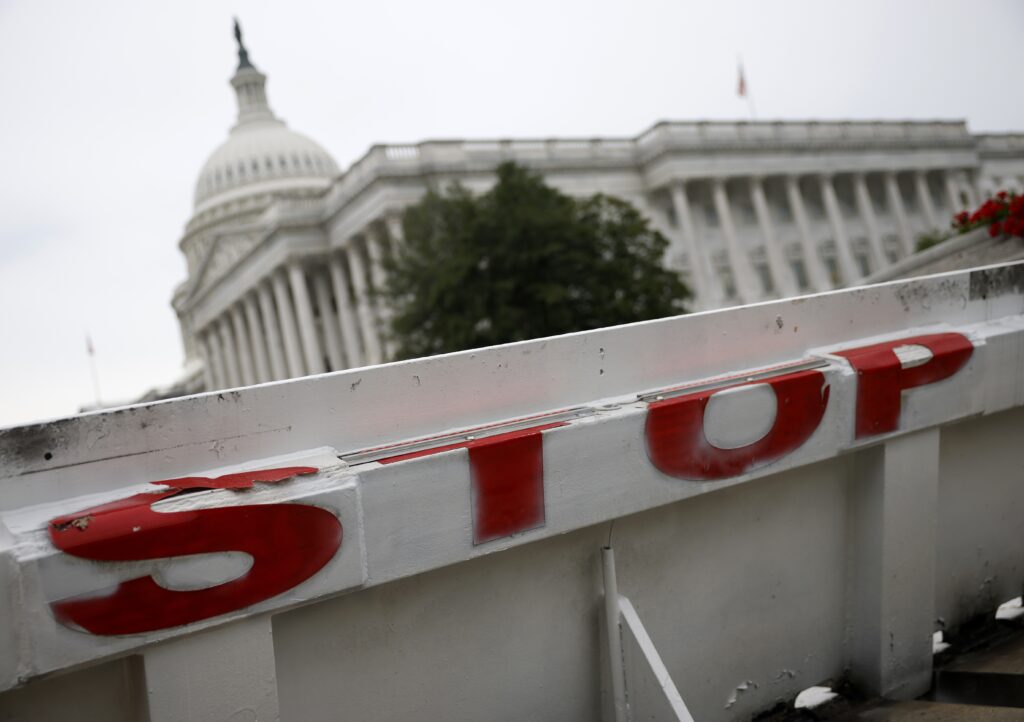
The U.S. Capitol is seen behind a barricade on Sept. 30, 2025 in Washington, DC. If lawmakers fail to reach a bipartisan compromise on the funding bill, the federal government shutdown will begin at midnight. (Photo by Kevin Dietsch/Getty Images)
WASHINGTON — A government shutdown could have significant economic consequences, though an analysis released Tuesday by the nonpartisan Congressional Budget Office said it’s difficult to pinpoint ramifications without knowing the length of a funding lapse or how exactly the Trump administration will try to reshape the federal workforce.
Director Phillip L. Swagel wrote in a four-page letter the agency projects about 750,000 federal workers would be furloughed, leading to a $400 million impact per day.
“The number of furloughed employees could vary by the day because some agencies might furlough more employees the longer a shutdown persists and others might recall some initially furloughed employees,” Swagel wrote.
New plans from the Trump administration to lay off federal employees en masse, he wrote, could significantly change those calculations.
The economic impacts and ramifications for business activity are hard to predict, he wrote, because it’s not yet clear how exactly the Trump administration will handle a shutdown or how long it will take congressional leaders to broker a stopgap funding agreement.
The partial government shutdown that began in December 2018 and lasted through January 2019 led to a loss of about $3 billion in gross domestic product that couldn’t be recovered, according to a prior CBO analysis that was referenced in the letter.
That represented about 0.02% of annual GDP in 2019.
Swagel wrote the “effects of a government shutdown on business activity are uncertain, and their magnitude would depend on the duration of a shutdown and on decisions made by the Administration.
“CBO expects that if a government shutdown persisted for several weeks, some private-sector entities would never recover all of the income they lost as a result of the suspension of federal activity.”
CBO conducted the analysis after receiving a request from Iowa Republican Sen. Joni Ernst.
Thune, Schumer debate shutdown on Senate floor
A government shutdown will begin Wednesday unless congressional leaders broker a stopgap funding agreement before the new fiscal year starts.
That seemed like a long shot early Tuesday afternoon as Senate Majority Leader John Thune, R-S.D., and Senate Minority Leader Chuck Schumer, D-N.Y., engaged in a brief debate on the floor, a rarity.
Thune said Democrats would have the same leverage on health care issues they have now in mid-November, when the stopgap spending bill that passed the House but stalled in the Senate would expire.
“They will have another funding cliff they can take advantage of come November the 21st,” Thune said. “This funds the government and protects federal workers and the American people from the hostage-taking that has become, evidently, now the Democratic norm. Even though it’s something they decried not that many years ago.”
Thune told reporters afterward the chamber would likely be out of session for Yom Kippur, which begins shortly before sunset on Wednesday and continues until Thursday night, but would otherwise hold votes during a shutdown.
“We will observe the Jewish holiday, but I would expect additional votes throughout the week,” Thune said. “I mean, we filed last night on a whole new bunch of (nominees) and I would expect additional votes on funding the government.”
Speaker Mike Johnson, R-La., canceled the House’s schedule for this week and doesn’t plan for that chamber to go back into session until Oct. 6 at the earliest.
Meeting breaks up with no deal
Congressional leaders, including Schumer and House Minority Leader Hakeem Jeffries, met with President Donald Trump at the White House on Monday, but were unable to make progress toward a stopgap funding agreement.
Schumer said on the Senate floor Tuesday that Democrats need a deal with GOP leaders to extend the enhanced tax credits for people who buy their health insurance on the Affordable Care Act Marketplace, which are set to expire at the end of the year.
“In a day or two, millions of Americans — millions — are going to get notices that their insurance premiums will rise an average of $400 a month, $5,000 a year,” Schumer said. “A middle-class family can’t afford that. We want to renew those credits, among other things in health care. But renew those credits so that people won’t pay that horrible increase.”
Schumer called Republican assertions that Democrats want immigrants without legal status to have access to federal health care programs, like Medicare and Medicaid, “utter bull.”
“There is no money, not a penny of federal dollars that are going there. So why do they bring this up? Because they’re afraid to talk about the real issue, which is health care for American citizens, health care for people who need the health care and can’t afford these premiums,” Schumer said.
Without a new funding law before the start of the fiscal year at 12:01 a.m. on Wednesday, the government will begin shutting down.
The ramifications will be significantly broader than the 35-day shutdown that took place during Trump’s first term, when five of the dozen full-year government spending bills had become law.
That isn’t the case this time around and a shutdown is expected to affect every department and agency to varying degrees.
‘They’re taking a risk’
White House Office of Management and Budget Director Russ Vought has also called on Trump administration officials to implement mass layoffs during a prolonged funding lapse.
Trump said during a press conference in the Oval Office on Tuesday that he didn’t want a shutdown but that his administration might take sweeping action to restructure the federal government if one does begin.
“We can do things during the shutdown that are irreversible, that are bad for them and irreversible by them, like cutting vast numbers of people out, cutting things that they like, cutting programs that they like,” Trump said, referring to Democrats. “So they’re taking a risk by having a shutdown, because because of the shutdown, we can do things medically and other ways, including benefits.”


![[Aggregator] Downloaded image for imported item #1142450](https://whitecounty.com/wp-content/uploads/2025/09/uscapitolstop2025-1024x722-2-696x491.jpg)


